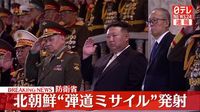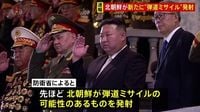On May 8, 2025, the Ministry of Defense of Japan confirmed that North Korea launched a ballistic missile, raising alarms in the region. Defense Minister Yasukazu Nakatani stated that the missile did not land in Japan's Exclusive Economic Zone (EEZ) and that there were no reports of damage resulting from the launch.
Prime Minister Fumio Kishida responded promptly to the situation, directing his government to prioritize information gathering and analysis. He emphasized the importance of providing the public with accurate and timely information. Kishida instructed relevant ministries to ensure the safety of aircraft and ships and to prepare for any unforeseen circumstances.
In light of the missile launch, the Japanese government convened an emergency response team to monitor the situation closely. Kishida, speaking to reporters at the Prime Minister's official residence, remarked, "I am aware of the information. I have instructed to investigate the details thoroughly." This proactive approach highlights Japan's commitment to national security and public safety.
According to South Korea's Joint Chiefs of Staff, North Korea fired multiple short-range ballistic missiles from the Wonsan area in Kangwon Province between 8:10 AM and 9:20 AM local time. The missiles reportedly traveled approximately 800 kilometers before landing in the Sea of Japan. This incident marks another provocative act by North Korea, which has been increasing its missile testing activities in recent months.
The launch has drawn international attention, with various governments expressing concern over North Korea's escalating military capabilities. Analysts suggest that these actions are part of North Korea's strategy to assert its power and negotiate from a position of strength on the global stage.
In Japan, the public's reaction to the missile launch has been one of apprehension. Citizens are keenly aware of the potential threats posed by North Korea and are looking to their government for reassurance and effective measures to ensure their safety. The Japanese government has been under pressure to enhance its defense capabilities and strengthen alliances with other nations, particularly the United States and South Korea.
As the situation develops, the Japanese government continues to monitor North Korea's actions closely. Experts are analyzing the implications of this missile launch and what it means for regional stability. The ongoing tensions on the Korean Peninsula serve as a reminder of the fragile security environment in Northeast Asia.
In related news, the rising prices of rice in Japan have drawn criticism towards the Ministry of Agriculture, Forestry and Fisheries, with commentators labeling it a significant failure. The average retail price of rice has reportedly increased for 17 consecutive weeks, causing concern among consumers. This economic issue adds another layer of complexity to the government's current challenges.
As the government grapples with both security and economic issues, Prime Minister Kishida's leadership will be tested. The balance between addressing immediate threats from North Korea and managing domestic concerns like rising food prices will require careful navigation.
In summary, North Korea's missile launch on May 8, 2025, has reignited fears in Japan and the surrounding region. The Japanese government is taking decisive action to ensure public safety while also facing economic challenges that affect its citizens. The interplay between these issues will be crucial in shaping Japan's policies and responses in the coming weeks.





